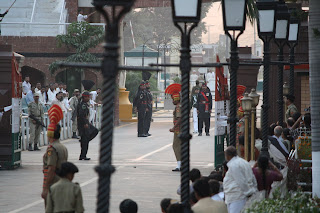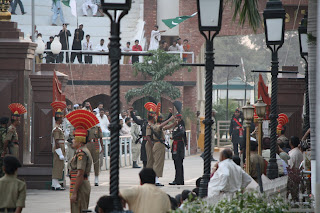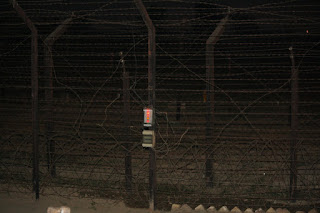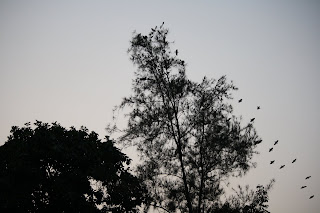Tuesday, October 27, 2009
My raison d'etre
When I looked around and saw only happy faces, I knew every thing was all right, but still, battling anxiety I asked, "All fingers in place?" My mother was so engrossed, she did not hear. For the new dad, it was love at first sight. Even if the baby was born limbless, he perhaps would not have cared. And my brother and the cousins who had gone there to support me, the less said the better. One look at the baby and they forgot all about me.
Ishita's birth was a celebration in my family. She was the first grandchild. To witness her birth, at least 15 members of my family had turned up. Wait a minute,probably there were more. Ask Sujata, she might have the right number. I was drugged out of my mind (thank God) and have no recollection whatsoever. I am not good with numbers even when I am not giving birth anyway.
So, after a while, when I realised there was no help coming from my mom or my dad, I yelled. "Hello, does anyone remember I exist?" My husband came hurriedly to my side and said, "Need the doctor? Will call." And disappeared again.
She was the cutest baby born in the family for a long time. Actually, she was the only baby born in the family for a long time. My brother's son, who was next, came 4 years later. For 4 years, she enjoyed being the only one, pampered and loved, spoiled and cosseted. The initial years, which kind of merge in my mind, were the years of discovery. Witnessing a tiny infant, slowly growing up to be a beautiful girl. Nature's greatest miracle.
Over the years, I have tried to be a teacher, as well as a mother. Teaching her to stand up after she fell. Teaching her to talk. To read and to write. Teaching her to respect every individual, to show love and kindness...but a lot of the time, the roles were reversed. It was she who taught me to be patient. It was she who taught me to be unbiased . To find pleasure in the smallest things. To find laughter in Disney characters. From her I learned that every day was a new day and nothing was commonplace. There was joy to be found even in chasing a butterfly.
She is still teaching me. I have learned lately that my love is not always unconditional. At times I am guilty of loving less.That I am capable of harsh words.That though I am her staunchest ally, I am also her worst critic. From her I learn every day that motherhood is not easy, specially when you are a mother of a teen.
So there are slammed doors and angry tears. Ugly skirmishes and yelling matches. There are hurtful words and lack of understanding.But there is also love, beneath all the overwhelming thoughts.
Over these 14 years I have realised that my daughter is the central point of my life. Though I did not set out to be a full time mother, this is what has made my life rich. She is the motive for everything that I do and being her mother is the identity I have carved out for myself. And when I see her happy, vibrant and smiling, I know I have not done a bad job.
Happy Birthday sweetie-pie.May you get everything that you wish for in life, including that i-pod. But don't wish for a boy friend just yet. There's still some time for that.
Like may be when you are 28?
Saturday, October 24, 2009
Borders
Though my grandfathers on both sides had come to India a few years before Independence, both had properties and firm roots in East Bengal. They used to refer to their native villages as "Desh" or homeland. My father's family went to the ''Desher Baari'' or the ancestral house to celebrate Durga Puja every year. But suddenly, one fine day in August, a hurriedly drawn line by some British gentlemen, told them that they could no longer go back to their homes again.
Displaced, landless, jobless, hoards of traumatic relatives reached my paternal grandfather's house. My grandfather's older brother, was so shattered by this forced migration that he never recovered from this shock. Along with his home, his livelihood and his sense of belonging, he also lost his mind.
My parents might not be true refugees,but my in-laws were not so fortunate. A single cruel blow of fate and both were left homeless. My mother in law at times, reluctantly and haltingly tells us how she, along with her siblings, had to hide in various places when the furious mob attacked the village. How, despite the tremendous hardship and resistance, the family decided to stay back for another year just because her elder brother was taking the matriculation exams. Leaving Dhaka would have meant discontinuing his studies as the family did not have the money to send him to school in India. There, in his school in Dhaka, he used to get a scholarship. Even now, she gets traumatised when she sees a crowd of people. In her mind, the friendly scores of people at Indian railway stations turn into hostile and angry mob out to attack her. She is not alone. In every household of East Bengal refugees, there are men and women like her, who still desperately try to suppress such painful memories. Along with these, they also try to suppress the memories of lush green fields, mango orchards, fishing in village ponds, numerous rivers and their scenic villages. Calcutta, with its numerous concrete houses, narrow bylanes, smoggy skies and so many people, never seem like home.
Growing up in Delhi, one could not ignore the existence of the Punjabi migrants who came as refugees to the national capital. Perhaps their story was the most violent. The mass exodus between the divided state saw countless deaths .Each one more painful than the other. The murders, rapes, and brutalities had gone on for months in the name of religion on both sides. I heard stories of ordinary men, like my tailor, the local grocer, the fathers of my friends. How they all travelled, loaded in trains and bullock carts,army trucks or on foot. Such a long distance, without food, without water. Always in fear of their own neighbours who had suddenly turned into their sworn enemies.
I became close to some Sindhi women only after coming to Bombay. Of the three communities, their loss perhaps is the most unmeasured. They came into a country which was formed on linguistic lines. Here, they not only had no state, they had no one who spoke their language, no one who followed their tolerant Sufi belief, no one who followed their culture. After the trauma of losing their language, their culture, their territory, they also had to go through the indignity of hearing once that the word Sindh had no place in our national anthem as the said teritory lay in a hostile nation. The house where I currently stay, belonged to a Sindhi lady. One afternoon, while chatting, I discovered her mother had crossed over to India when she was pregnant She got separated from her family in that chaotic period. All alone, at the age of nineteen, with a group of migrants, she travelled to Bombay by ship. From there, she went on to Madras, where her husband had found a job. Much later, through intensive search, she managed to locate her lost family.Even now, at the age of 80+, this courageous lady stays there, all alone, after her husband's death. Her story, gave me goosebumps. I wondered what I would have done, if I were in her shoes.
The rest of the Indians, who perhaps without thinking label the Punjabis as aggressive and pushy, the Sindhis as cunning and miserly, the Bengalis as timid and reluctant to leave their comfort zone, do they ever try to learn the psyche of these scarred people? I wonder.
No matter how much we try to shake it off, the past stays with us. No matter how much we say that the Partition is over and done with, it still continues to scar us.. As long as we have people still living with us who were directly impacted by this tragedy, it will continue to haunt us. And if we ever forget the trauma it caused, there is a danger of this happening again.
I took my children to Amritsar to show them the Golden temple and the Wagah border this Diwali. At Wagah, I expected heart break and silence and found jubilation and Bhangra beats instead.. A synchronised show of mock hostility. Patriotic songs. Euphoric dances. A loud and passionate cry of Bharat Mata Ki Jai or Vande Mataram once in a while This was not the cry I had expected. This was not how I had imagined the border to be. I thought people would shed tears and lament. Light a candle for peace. Try to make sense of something that was so unnecessary. But this was almost a celebration. This brought laughter. What about the lives lost? Does anybody want to remember?
I looked around and saw most people in their 20s, to whom Partition meant nothing. The iron gates that stood between the two nations did not stir any passion. The people from the other side did not arouse any interest.
Perhaps this was better. We have come a long way since Independence. Unlike my parents' generation who always said India lost both her arms at the time of Independence, we have come to think of India as a whole nation and not as a fractured one. But what about the painful memories? How to heal them?
On my way back to the hotel, I kept on hearing my mother in law's voice in my mind. " Tui amake ekbaar Dhaka te niye jaabi? Amar boro dekhte ichha hoy" ( Will you take me to Dhaka once? I wish to see it one more time.)
How do I describe the exaggerated pomp and show that takes place in Wagah every day, to her? What will she think of this border? Will this ever make sense? Will she ever think the border is a happy place? I really do not know.
The India-Pakistan partition saw the largest migration in human history. Nearly 10 million people lost their homes. A million lost their lives.
Various videos of the Wagah retreat ceremony are available on youtube.You can have a look if you are interested.
These are some of the images that our camera caught. The last shot is of the flock of birds that kept flying from one side to another. They, unlike us, knew the real meaning of freedom.







Sunday, October 11, 2009
Questions
(My brother-in -law to all his Facebook friends, after the Nobel Peace Prize was declared this year))
If Einstein was so intelligent, then how come did he not know his hair looked like Mt Etna on a bad day?
( The owner of a salon to me, when I told her I wanted a hair cut that would make me look intelligent.)
If money grew on trees, would we have cut them down? And would we have put our apples in the bank?
( My daughter Ayushi, on being told she had to eat some fruits every day.)
Why do you have to throw your sense of humour at me while I am driving?
(My husband to me , when I asked him why the slowest traffic at office time was called rush hour.)
Why didn't you invite me to your wedding?
(My daughter Ishita, while looking at my wedding snaps, when she was 3)
Do you like to cook, clean, sew and solve mathematical problems?
( My mother-in-law to me, when she came to 'see' me for her son)
If god does exist, then does that mean that I do not?
(One of my husband's cousin to us, who was an atheist)
If I go away on a 15 day break, will you all miss me? And will you guess the place I am going if I tell you there is a beautiful temple there?
( Aparna to all her readers, just before going off to her vacation)
Wednesday, October 7, 2009
Those Speechless Moments
For a school programme, she was asked to dress up in a saree and mouth a really long dialogue.
The conversation went like this.
Baby : I am Sarojini.
Me : Ok, will do....
The day of the programme daddy and mommy went to see Baby perform.
Teacher : Now comes Ayushi, dressed as ...who are you honey?
Baby : I am Sarojini Nagar market.
Me :
Then she turned three. And the conversation went like this.

Baby: Mama, why is
Me : Like what baby?
Baby : With one leg crossed?
Me : That's his pose for playing the flute.
Baby : I think he needs to go to susu and he is trying to control himself because there is no bathroom.
Me :
And this happened when she was 5.

Me : Baby,come here. I will take your photograph.
Baby: Can I paint my teeth with your glitter nail polish first?
Me: Whatever for?
Baby: I want my teeth to sparkle and shine when I smile at the camera.
Me:
And then she turned really intelligent when she was 6.
Baby: Mama, who are these men?
Me : This is Ratan Tata. And this one is Adi Godrej.
Baby : What kind of parents did they have?
Me : I think pretty good. Why do you ask?
Baby: They were cruel to name their children after trucks and almirahs. Do you think their friends teased them in school because of their names?
Me :
And this conversation happened just two weeks back.
Baby: Do you think I can celebrate my birthday in the place that opened recently?
Me : I don't think so. That is a place for grown ups.
Baby :Why do you say that?
Me: Because what they serve is not meant for children. They serve what adults like.
Baby: Oh! you mean they serve drugs and alcohol?
Me :
Exactly 8 years ago, more or less at this time, I had looked up and seen the beaming face of my doctor." Congratulations," she had said.
Then she had tried to look sombre. " Did you want a boy?"
I had looked around and seen the anaesthetist taking off her gloves. She had smiled and winked at me. The paediatrician was still holding the baby and she had seemed completely enamored with the new born. I had also seen the two nurses who had tirelessly helped the doctors.
Through out the process, the doctors had discussed amongst themselves the most comfortable yet fashionable shoes to wear in the hospitals. They had discussed the challenges of working mothers. Their parents and their special needs. And had cracked jokes. I did not know whether they did all this it to keep my mind off my anxiety. Or that was how they always worked.
Incidentally, I was also vaguely aware of the presence of two males during my ordeal. One had become so nervous that he almost destroyed the corridors of the hospital with his pacing. The other one was the orderly who had wheeled me in. Did I want a boy?
That was my best speechless moment as a mother.

